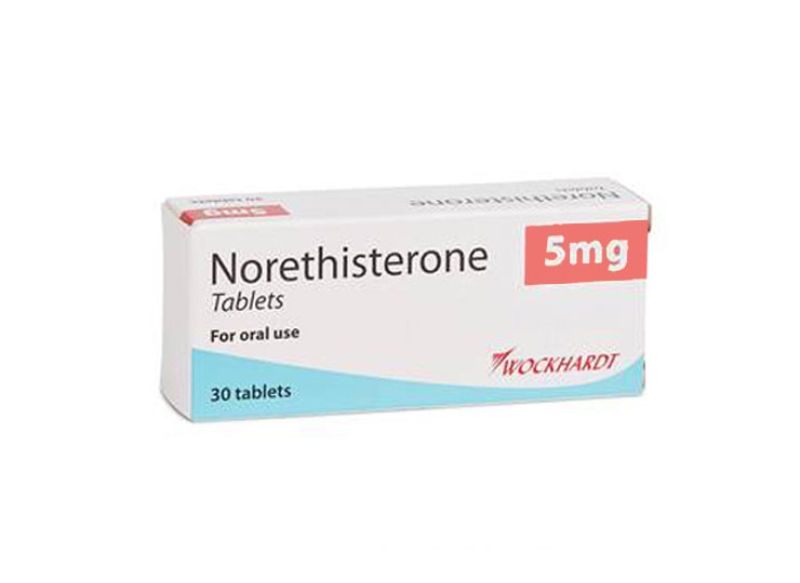Norethisterone is a synthetic progestogen that is similar to the progesterone hormone we naturally produce. During a menstrual cycle, the level of progesterone hormone falls which causes your womb lining to shed and your period to occur. If progesterone - or norethisterone - is taken throughout, the levels don't drop which prevents menstruation from taking place. As norethisterone balances the progesterone in your system, it is also used to treat painful, heavy or irregular periods, endometriosis and breast cancer.
How well norethisterone works varies between women. Norethisterone will almost always delay your period when taken as advised. It can allow you to delay your period for up to 17 days. After you stop taking it, your period will return in 2-3 days. The majority of women will have no vaginal bleeding whilst taking Norethisterone although a small number may experience light bleeding.
We prescribe up to 30 days of norethisterone. It needs to be taken 3 times a day. If you need to delay your period for longer than a month, we would suggest asking your doctor about using a combined contraceptive pill instead.
All period delay treatments may not be 100% effective. Norethisterone can still cause breakthrough bleeding during use. Making sure you take your treatment exactly as prescribed is the best way to get the most out of it.
The medication has to be taken three days before your period is due and you will have to take one tablet three times a day for up to 20 days in total. This will delay your period for this amount of time and you should start bleeding two to four days after you stop taking the pills. Some women report that their cycle changes after taking norethisterone but this usually settles down.
If you start the course fewer than three days before your period is due, it might not work and you’ll still have bleeding or spotting.If your period does not come back within the 3 days, talk to your doctor in case you are pregnant.
If you forget to take a dose of norethisterone, take the tablet as soon as you remember and then continue to take your other tablets at the normal time. However, do not take a double dose to make up for a forgotten dose. Contact your doctor straight away if you have taken more tablets than you should.
Always use this medication exactly as your clinician has told you. Check with our clinical team or your GP or pharmacist if you are not sure.
Medicines and their possible side effects can affect individual people in different ways. The following are some of the side effects that are known to be associated with this medicine. Just because a side effect is stated here, it does not mean that all people using this medicine will experience that or any side effect.
Norethisterone when taken for period delay may cause side effects including:
- Breast tenderness
- Nausea
- Headache
- Disturbances in mood
- Spotting
- Irregular bleeding
- A lower sex drive
- Upset stomach
The longer you take the tablets for, the more likely you’ll experience side effects.
Get emergency medical help if you have signs of an allergic reaction to this medication. These include:
- Hives
- Dizziness
- Fast or pounding heartbeats
- Wheezing
- Difficult breathing
- Swelling of your face, lips, tongue, or throat.
For full information on warnings, medication interactions and contraindications, refer to the Patient Information Leaflet. Please read all packaging and the Patient Information Leaflet before taking any new medicine and inform our clinical team or your GP of medicines you are taking or intend to take.
As Norethisterone does not act as a contraception when taken for period delay, therefore it is important to consider if you need alternative contraception such as condoms. However Norethisterone should not be used if you are already taking the combined pill. In this case, you could take two packs of combined contraceptive pills back to back to skip a period, this will vary depending on the type of combined pill you use.
You should avoid taking the medication if you are pregnant or think you could be, as the hormones could affect the development of the baby. If there is any doubt in your mind, you should take a pregnancy test before seeking a prescription for Norethisterone. If you are unsure when you visit the doctor, they may ask you to take a test then and there.
Norethisterone contains a high dose of progesterone, which is metabolised in the body into an oestrogenic hormone called oestradiol, which if left untreated increases the risk of heart problems and kidney damage in addition to strokes.
You should avoid taking the medication if you are breastfeeding, if you have abnormal vaginal bleeding that hasn’t been investigated by a doctor, or if you have a known, suspected or past history of genital or breast cancer, have a liver problem,have a personal or a significant family history of thrombosis (blood clots).
Get emergency medical help if you have signs of an allergic reaction to this medication. These include:
- Hives
- Dizziness
- Fast or pounding heartbeats
- Wheezing
- Difficult breathing
- Swelling of your face, lips, tongue, or throat.
It is important that you let us know which prescription, over-the-counter medicines and recreational drugs you are currently taking. You must also tell us about any other medical conditions that you currently have (or had in the past). This will help us ensure the prescribed medication is safe and appropriate for you to take.
For full information on warnings, medication interactions and contraindications, refer to the Patient Information Leaflet. Please read all packaging and the Patient Information Leaflet before taking any new medicine and inform our clinical team or your GP of medicines you are taking or intend to take.





